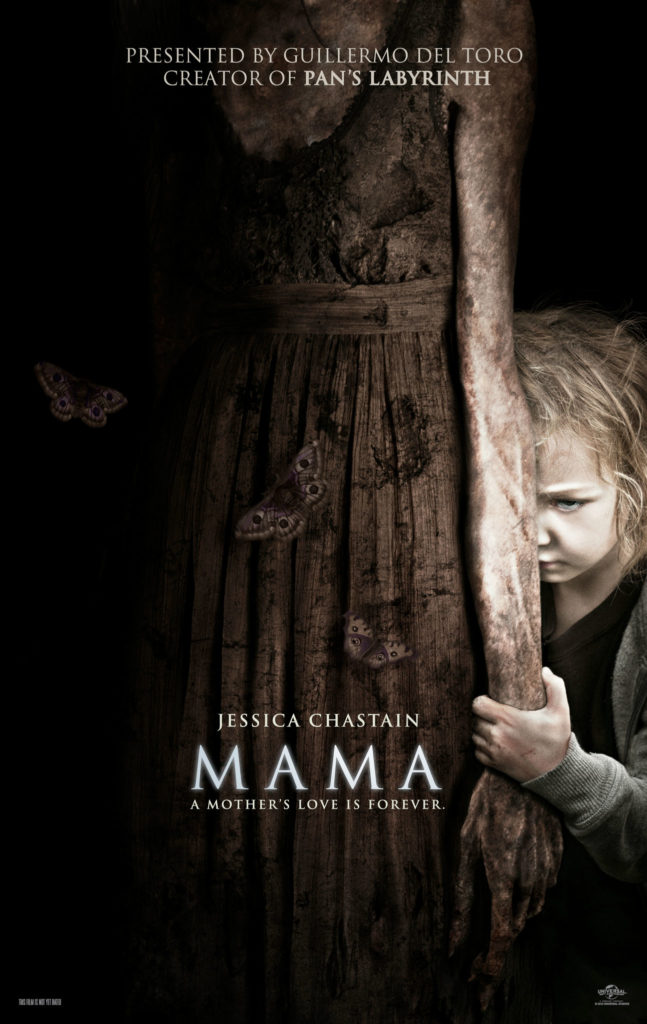 The last horror flick I saw with Guillermo del Toro serving as executive producer was The Orphanage, from 2007. I reviewed it in last year’s Horrorshow, and while I did like it, I lambasted it for its derivative nature. This time around, the film del Toro chose to attach his name to is Mama, from writer/director Andres Muschietti. It’s also a fairly derivative horror flick, in that there’s not much happening on screen that will be all that unfamiliar to horror fans, but unlike The Orphanage, I couldn’t find any quotes online where the director is being a pretentious ass, so there’s that.
The last horror flick I saw with Guillermo del Toro serving as executive producer was The Orphanage, from 2007. I reviewed it in last year’s Horrorshow, and while I did like it, I lambasted it for its derivative nature. This time around, the film del Toro chose to attach his name to is Mama, from writer/director Andres Muschietti. It’s also a fairly derivative horror flick, in that there’s not much happening on screen that will be all that unfamiliar to horror fans, but unlike The Orphanage, I couldn’t find any quotes online where the director is being a pretentious ass, so there’s that.
Mama tells the story of two lost little girls and the ghost that loves them. Beginning during the financial crisis in 2008, a businessman played by Nikolaj Coster-Waldau goes on a murderous killing spree (thankfully off camera). He kidnaps his two young daughters and flees the city for the countryside. After a car accident, the trio are lucky to survive, and they seek shelter in an abandoned cabin in the woods. There, Nikolaj is about to finish off his bad day by killing his daughters, but a spectral apparition inhabiting the cabin gets to him first, saving the girls’ lives.
Fast-forward five years and the girls are found living in the cabin in a feral state by some trackers hired by the businessman’s brother, Lucas, also played by Coster-Waldau. The girls have been without human contact for the entire time they’ve been missing. Consequently, they’re in for some serious therapy, provided by Dr. Dreyfuss (Daniel Kash). The final piece of the puzzle is Lucas’s live-in girlfriend, Annabel, played by Jessica Chastain in a wig. The wig is important. It can’t go without mention because it had the loudest performance in the film. I think the wig even did some pressers back in January.
Anyway, the girls come to live with Lucas and Annabel, but it turns out they’ve been followed to their new home by the entity they call Mama, who had been caring for them during their time in the woods.
Mama whipsaws back and forth between benevolent and malevolent as the story requires, and the situation dictates. She’s obviously pretty good with the kids, if overprotective to the point of being murderous. A viewer could be forgiven for hoping that Lucas and Annabel could come to some sort of equitable arrangement with Mama regarding her visitation rights, but that’s just fantasy. Custody battles rarely go well, and Mama, being a dead person of no relation to the children, has no standing in court.
Mama’s appearances are fairly creepy, although the CGI is a bit suspect. Muschietti is no slacker filmmaker, showing a deft touch that belies his lack of experience here and there. I’m thinking of the blanket scene. A viewer will know it when they see it. The storytelling is consistent and deft throughout, right up until an ending that falls a bit flat, but that’s only because, like all ghost films, the big reveal also corresponds with the end of the frights. But such is the way of all things, I guess.
Muschietti is helped along greatly in this film by the performances of the two young actresses, Megan Charpentier and Isabelle Nélisse. The younger of the two, Nélisse, gives an expressive and deep performance that I did not think a person of her young age would have been capable. It almost makes up for the countless films that feature dead readings from overmatched children. And lest you think I’m picking on kids, I’m not. Filmmaking is a grown up business, and acting is a profession that takes time to master; time that children, by their very youth, do not have. So when a young actress shows up in a film and not only doesn’t drag it down, but puts in the best performance of the cast, I notice.
At heart, Mama tells the familiar story of a mother or mother figure, in this case Annabel, protecting children from a ghost looking to take those children away. We’ve all seen this movie. It was called Poltergeist. But Mama adds enough of its own twists and turns to stand on its own. In a genre with so many mangy dogs, Mama stands out for its competence as a film.
